#Free Christian literature
Note
Yo, I saw your post about orientalism in relation to the "hollywood middle-east" tiktok!
How can a rando and university dropout get into and learn more about? Any literature or other content to recommend?
Hi!! Wow, you have no idea how you just pressed a button. I'll unleash 5+ years on you. And I'll even add for you open-sourced works that you can access as much as I can!
1. Videos
I often find this is the best medium nowadays to learn anything! I'll share with you some of the best that deal with the topic in different frames
• This is a video of Edward Said talking about his book, Orientalism. Said is the Palestinian- American critic who first introduced the term Orientalism, and is the father of postcolonial studies as a critical literary theory. In this book, you’ll find an in-depth analysis of the concept and a deconstruction of western stereotypes. It’s very simple and he explains everything in a very easy manner.
• How Islam Saved Western Civilization. A more than brilliant lecture by Professor Roy Casagranda. This, in my opinion, is one of the best lectures that gives credit to this great civilization, and takes you on a journey to understand where did it all start from.
• What’s better than a well-researched, general overview Crash Course about Islam by John Green? This is not necessarily on orientalism but for people to know more about the fundamental basis of Islam and its pillars. I love the whole playlist that they have done about the religion, so definitely refer to it if you're looking to understand more about the historical background! Also, I can’t possibly mention this Crash Course series without mentioning ... ↓
• The Medieval Islamicate World. Arguably my favourite CC video of all times. Hank Green gives you a great thorough depiction of the Islamic civilization when it rose. He also discusses the scientific and literary advancements that happened in that age, which most people have no clue about! And honestly, just his excitement while explaining the astrolabe. These two truly enlightened so many people with the videos they've made. Thanks, @sizzlingsandwichperfection-blog
2. Documentaries
• This is an AMAZING documentary called Reel Bad Arabs: How Hollywood Villifies A People by the genius American media critic Jack Shaheen. He literally analysed more than 1000 movies and handpicked some to showcase the terribly false stereotypes in western depiction of Arab/Muslim cultures. It's the best way to go into the subject, because you'll find him analysing works you're familiar with like Aladdin and all sorts.
• Spain’s Islamic Legacy. I cannot let this opportunity go to waste since one of my main scopes is studying feminist Andalusian history. There are literal gems to be known about this period of time, when religious coexistence is documented to have actually existed. This documentary offers a needed break from eurocentric perspectives, a great bird-view of the Islamic civilization in Europe and its remaining legacy (that western history tries so hard to erase).
• When the Moors Ruled in Europe. This is one of the richest documentaries that covers most of the veiled history of Al-Andalus (Muslim Spain). Bettany Hughes discusses some of the prominent rulers, the brilliance of architecture in the Arab Muslim world, their originality and contributions to poetry and music, their innovative inventions and scientific development, and lastly, La Reconquista; the eventual fall and erasure of this grand civilization by western rulers.
3. Books
• Rethinking Orientalism by Reina Lewis. Lewis brilliantly breaks the prevailing stereotype of the “Harem”, yk, this stupid thought westerns projected about arab women being shut inside one room, not allowed to go anywhere from it, enslaved and without liberty, just left there for the sexual desires of the male figures, subjugated and silenced. It's a great read because it also takes the account of five different women living in the middle east.
• Nocturnal Poetics by Ferial Ghazoul. A great comparative text to understand the influence and outreach of The Thousand and One Nights. She applies a modern critical methodology to explore this classic literary masterpiece.
• The Question of Palestine by Edward Said. Since it's absolutely relevant, this is a great book if you're looking to understand more about the Palestinian situation and a great way to actually see the perspective of Palestinians themselves, not what we think they think.
• Arab-American Women's Writing and Performance by S.S. Sabry. One of my favourite feminist dealings with the idea of the orient and how western depictions demeaned arab women by objectifying them and degrading them to objects of sexual desire, like Scheherazade's characterization: how she was made into a sensual seducer, but not the literate, brilliantly smart woman of wisdom she was in the eastern retellings. The book also discusses the idea of identity and people who live on the hyphen (between two cultures), which is a very crucial aspect to understand arabs who are born/living in western countries.
• The Story of the Moors in Spain by Stanley Lane-Poole. This is a great book if you're trying to understand the influence of Islamic culture on Europe. It debunks this idea that Muslims are senseless, barbaric people who needed "civilizing" and instead showcases their brilliant civilization that was much advanced than any of Europe in the time Europe was labelled by the Dark Ages. (btw, did you know that arabic was the language of knowledge at that time? Because anyone who was looking to study advanced sciences, maths, philosophy, astronomy etc, had to know arabic because arabic-speaking countries were the center of knowledge and scientific advancements. Insane, right!)
• Convivencia and Medieval Spain. This is a collection of essays that delve further into the idea of “Convivencia”, which is what we call for religious coexistence. There's one essay in particular that's great called Were Women Part of Convivencia? which debunks all false western stereotypical images of women being less in Islamic belief. It also highlights how arab women have always been extremely cultured and literate. (They practiced medicine, studied their desired subjects, were writers of poetry and prose when women in Europe couldn't even keep their surnames when they married.)
4. Novels / Epistolaries
• Granada by Radwa Ashour. This is one of my favourite novels of all time, because Ashour brilliantly showcases Andalusian history and documents the injustices and massacres that happened to Muslims then. It covers the cultural erasure of Granada, and is also a story of human connection and beautiful family dynamics that utterly touches your soul.
• Dreams of Trespass by Fatema Mernissi. This is wonderful short read written in autobiographical form. It deconstructs the idea of the Harem in a postcolonial feminist lens of the French colonization of Morocco.
• Scheherazade Goes West by Mernissi. Mernissi brilliantly showcases the sexualisation of female figures by western depictions. It's very telling, really, and a very important reference to understand how the west often depicts middle-eastern women by boxing them into either the erotic, sensual beings or the oppressed, black-veiled beings. It helps you understand the actual real image of arab women out there (who are not just muslims btw; christian, jew, atheist, etc women do exist, and they do count).
• Letters of Lady Mary Wortley Montagu. This is a feminist travel epistolary of a British woman which covers the misconceptions that western people, (specifically male travelers) had recorded and transmitted about the religion, traditions and treatment of women in Constantinople, Turkey. It is also a very insightful sapphic text that explores her own engagement with women there, which debunks the idea that there are no queer people in the middle east.
---------------------
With all of these, you'll get an insight about the real arab / islamic world. Not the one of fanaticism and barbarity that is often mediated, but the actual one that is based on the fundamental essences of peace, love, and acceptance.
#orientalism#literature#arab#middle east#islam#feminism#book recommendations#reference#documentary#western stereotypes#eurocentrism#queer#queer studies#gender studies#women studies#cultural studies#history#christianity#judaism#books#regulusrules recs#If you need more recs#or can’t access certain references#feel free to message me and I’ll help you out!#regulusrules answers
114 notes
·
View notes
Text
Need to start a book club for people who like Dostoevsky, Kierkegaard, Kafka, Rilke, Nietzsche. Also just to hang out on a discord server or something and be friends. I would like a close little group of friends, God knows it’s a lonely world, but I don’t think it has to be.
I’ve been reading The Idiot and I’m desperate to share my outpouring of feelings with someone. :^)
#classic literature#russian lit#dostoevsky#the idiot#crime and punishment#the brothers karamazov#rainer maria rilke#friedrich nietzsche#soren kierkegaard#existentialism#philosophy#book clubs#errrrr be my friend please#be my kindred spirit#no use being subtle about it#I think my kindred spirits must go on tumblr#I want the existentialists the melancholics the Christian mystics the free spirited artists#the armchair philosophers the fucked up pretentious intellectuals
102 notes
·
View notes
Text








I loved you—that's all I did.
And I Love Her - The Beatles // The Last Days Of Judas Iscariot - Stephen A. Guirgis // I Looked Away - Derek & The Dominoes
#im crazy insane about this play. god.#literature#theater#the last days of judas iscariot#stephen aldy guirgis#justice#free will#forgiveness#fate#the beatles#lyrics#web weaving#intertextuality#jesus christ#christianity#doomed by the narrative#tragic love
7 notes
·
View notes
Text
In the first World War they...
Who were they?Who cares anymore?
Killed four of my uncles
So I discovered one day.
There were only four on that side of the family
And all swept away in a few bad years
In a war the historians tell us now
Was fought over nothing at all.
Four uncles, as one might say
A dozen apples or seven tons of dirt
Swept away by the luck of history,
Closed off.Full stop.
Four is a lot of uncles,
A lot for lives, I should say.
Their chalk was wiped clean off the slate,
The war meant nothing at all.
War needs a lot of uncles,
And husbands, and brothers, and so on :
Someone must want to kill them,
Someone needs them dead.
Who is it, I wonder. Me?
Or is it you there, reading away,
Or a chap with a small - arms factory?
Or is it only they?
- Other People, by Chris Wallace - Crabbe
#literature#poetry#poems on tumblr#poems and poetry#poem#writing#free palestine#free gaza#gaza genocide#permanent ceasefire#war#english literature#writers and poets#writerscommunity#palestine#i stand with palestine#world war 2#world war 1#christianity#words#prose#prose poetry
10 notes
·
View notes
Text
Beneath the rising sun, in the farthest eastern sea
A promised land, once tranquil, once free.
Weeps for its children bleeding in the street,
Tired, bewildered, on bare feet they entreat.
Their faces stained with ever-flowing tears.
Their hearts bear burdens too heavy for their years.
Each day they watch helplessly as homes explode
Illuminating the sky as their hopes corrode.
By day the hide, by night , they count the dead
And time marches on, their homes turn to thread.
Theirs is the exhaustion of both heart and mind
No rest can ease the darkness they've confined.
Their pleas are drowned by the bombs' cruel sound
Falling from the sky, shattering sacred ground.
They cry out to god, "What have we done to bear this fate?",
Yet, this is the work of men, consumed by hate.
FREE PALESTINE
#free palestine#palestine#poetry#english literature#dark academy#middle east#artists on tumblr#poets on tumblr#israël#wrong#booktok#music#muslim#christianity#jewish
11 notes
·
View notes
Text
The Author
I happen to know a story
A Man
A something from the infinite
He had a passion for stories
For love
So He spoke a world with His might
Poked holes in the dark night
He made sure no matter where
There was light
There was life
He knitted some characters based from His own
They had a purpose to fulfill
Before their journey home
He had the maps
He knew the enemies
He knew the solutions
He knew how their road goes
But these characters with stories
They wrote their own
So until they read their stories
And asked the Author if they’re on track
They could never see
The unseen monsters that will attack
They would drag the Author’s beloved characters
To a pit of gnashing and groaning
And when they are there
They are unable to turn back
#poetry#maybe rebellion isn’t always the best option#i love it when art or literature has Christian undertones—#like the lotr or the hobbit#this one’s dark tbh😭#feel free to comment any analyses you have#analyses are like comments but better!
2 notes
·
View notes
Text
and perhaps the “children of light” has been withholding the fact that their light source comes from that which is radiated by the Lake of Fire
3 notes
·
View notes
Text
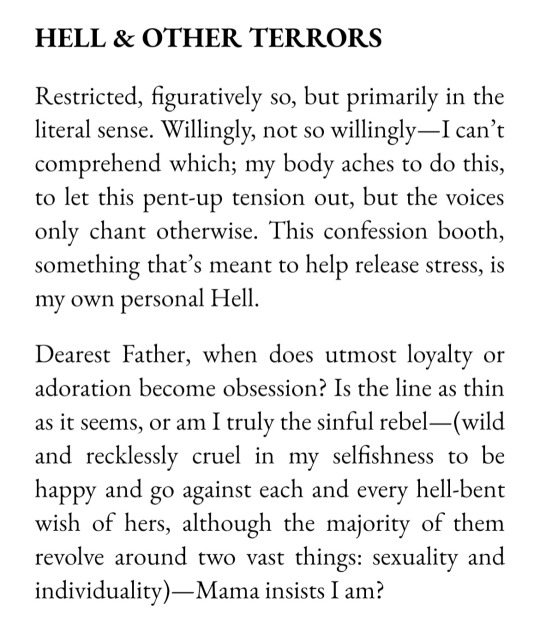
#short story#creative writing#prose poem#prose poetry#excerpt from a book i'll never write#flash fiction#poetic prose#writing#poetic#heaven and hell#spilled prose#dark prose#short prose#literature#literary fiction#short fiction#confession#religion#religious trauma#catholic#catholiscism#christianity#christian faith#jesus christ#god#poems and poetry#free verse#poems and fragments#poems on tumblr#vignette
4 notes
·
View notes
Quote
Because free will though it makes evil possible, is also the only thing that makes possible any love or goodness or joy worth having.
C. S. Lewis, Mere Christianity
7 notes
·
View notes
Text
Book Talk #3: A Clockwork Orange, Free Will, and Motives of Christian Ethos
Does motive matter in ethics? If you do the "right" thing for the wrong reason, is it still right? If you do the "wrong" thing for the "right" reasons, is it still "wrong"? Put your thinking cap on your gulliver, my droogies. Today, we're examining Anthony Burgess's A Clockwork Orange as a case study in ethics, as well highlighting a major flaw in Christianity (a noble pastime if there ever was one).

Part I: The Plot of A Clockwork Orange
I'll include only what's needed for the analysis here. It's still a book worth reading.
The book can roughly be into three parts. The first third is Alex committing horrible, violent crimes so we understand who he is and why he gets treated the way he does later in the book. After a rape and burglary goes bad, the woman he raped dies, and he is incarcerated for murder.
The next third documents Alex's time in prison, including his volunteering and selection for a clinical trial called "the Ludovico Technique." It a fictional form of aversion therapy that involves Alex watching violent and pornographic films while being injected with drugs to make him nauseous. The technique is a "success." When he leaves the program he becomes violently ill when he gets horny or tries to engage in violence. Admittedly, he was previously a rapist, but this procedure closes off even the possibility of consensual sex. Alex is now also incapable of being violent, this includes an inability to use violence in self defense. Because of the background music that was used in the films, he can't even listen to classical music any more, which used to one of his greatest joys.

(To make sure he watches the film, his eyelids are pried open, with scientists administrating eye drops. It's the definition of a captive audience.)
The last third follows his journey back in the free world. Mostly, it involves him being down on his luck. People are cruel to him, and many of the people he brutalized before going to prison, now seeing his defenseless state, exact revenge on him, beating him senselessly. Many readers feel sympathy for Alex at this point. He's no longer the monster he once was. He literally cannot be. One of the last scenes of the book is him being locked in a room, subjected to the blasting of classical music. To save himself the agony of his conditioning, he autodefenestrates (jumps out the window) in an attempt to kill himself.
The music was still pouring in all brass and drums and the violins miles up through the wall. The window in the room where I had laid down was open. I ittied to it and viddied a fair drop to the autos and buses and walking chellovecks below. I creeched out to the world: ‘Goodbye, goodbye, may Bog forgive you for a ruined life.’ Then I got on to the sill, the music blasting away to my left, and I shut my glazzies and felt the cold wind on my litso, then I jumped.
-A Clockwork Orange: Part 3, Chapter 5

Yes yes. I know left out many important plot points and symbolic details. The entire book is worth reading, and it's not that long either.
Part II: What A Clockwork Orange is Interpreted to Mean
Now that we have essential plot elements laid out, we can ask. Is Alex is now good? Most interpretations of the book at this point conclude that Alex is neither good nor evil. Take for example, an analysis by Thomas C. Foster, a professor emeritus of English at the University of Michigan-Flint. In his 2003 book, How to Read Literature Like a Professor, he states
When his capacity to choose is taken away, evil is replaced not with goodness but with a hollow simulacrum of goodness. Because he still wants to choose evil, he is in no way reformed. In acquiring the desired behavior through the “Ludovico Technique,” . . . society has not only failed to correct Alex but has committed a far worse crime against him by taking away his free will, which for Burgess is the hallmark of the human being.
Morality requires choice. We don't condemn hurricanes for their evil nature. Hurricanes are amoral, as hurricanes have no agency. People are understandably uncomfortable about thinking of human beings as being without free will. It would seem to undermine a core assumption on which society is built. And yet...
Part III: What Burgess Doesn't Get - The Problem of Free Will
For starters, it probably doesn't exist.
Perhaps the believers and the nonbelievers can be one day united in their skepticism of free will. For nonbelievers, there are deterministic arguments. But don't think that let's believers off of the hook.
Many Christians believe in an omniscient god. This appears to be directly incompatible with free will. I figured this out when I was about twelve or thirteen. If god knows I will choose A, then do I have free will to choose B? Not if god is omniscient.
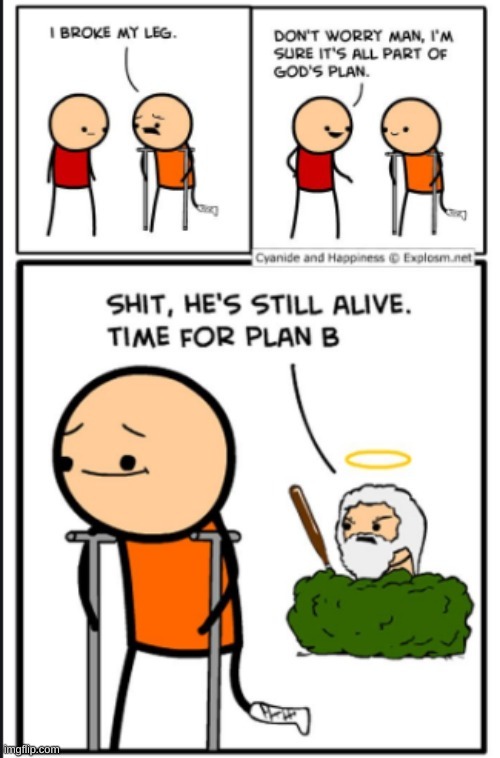
(If "god's plan" is a real thing, then you can kiss free will goodbye)
Part IV: "Good" Things for "Bad" Reasons
So let's take a step back from that for a second and assume, for the sake of argument, that free will exists. Who actually has it in a meaningful sense. Believers? Or nonbelievers?
Many Christians believe that actions on this earth determine your eternal place in heaven or hell, and that your placement there depends on doing various "good works."
(I know it's a theological debate between protestants, who believe in Sola Fide, or faith alone as a ticket to heaven, and Catholics, who believe it requires faith and good works.)
As a further side note, the requirement of faith itself has troubling implications. You don't control your faith. If I asked you to change your religious beliefs, right now, you couldn't' do it. In many respects, your beliefs can better be described as something that happens to you, rather than something you choose.
So assuming there is, in fact, free will, and ignoring the troubling implications of a faith requirement, let's talk about the good works component. Let's say you have a believing Catholic who wants to go to heaven. They are as convinced of heaven and hell and the truth of the bible as they are of gravity. They volunteer to feed the homeless. Did they do so in any meaningful way?
Let's put this another way. Imagine I approach you with a shovel in my hand. I credibly threaten to beat you senseless unless you feed the homeless. You comply. Did you do good by feeding the homeless? Is it even possible to know? If you help other people for a a selfish reason, how should that be morally judged?
These two situations are not so different. If you truly believe in the fire and brimstone, there are only two key differences separating the above scenarios. One is the depth of punishment and reward. Christian hell is a far greater punishment than being beaten with a shovel. The other is immanency. Being sent to hell won't happen immediately, but the catholic still believes it will happen. It seems to me that the punishment being delayed does not actually change the moral calculus. Whether punishment and reward are served immediately or in fifty years, the people in the above scenarios are still acting pro-socaily for selfish reasons. In this way, such a person, like Alex, has become a Clockwork Orange. Organic on the outside, mechanical on the inside, and stripped of any meaningful choice.
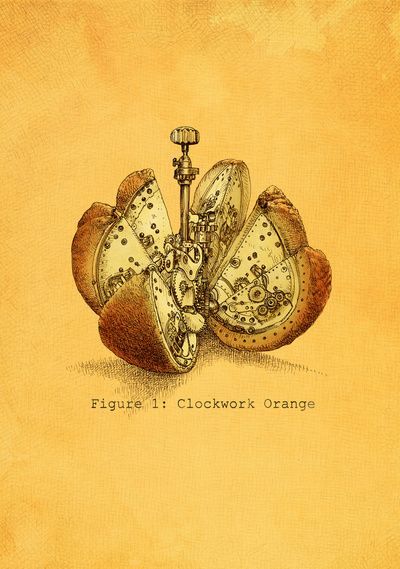
The book itself seems to recognize the tension between being a christian and being a person with free will.
‘Choice,’ rumbled a rich deep goloss. I viddied it belonged to the prison charlie. ‘He has no real choice, has he? Self-interest, fear of physical pain, drove him to that grotesque act of self-abasement. Its insincerity was clearly to be seen. He ceases to be a wrongdoer. He ceases also to be a creature capable of moral choice.’
‘He will be your true Christian,’ Dr Brodsky was creeching out, ‘ready to turn the other cheek, ready to be crucified rather than crucify, sick to the very heart at the thought even of killing a fly.’ And that was right, brothers, because when he said that I thought of killing a fly and felt just that tiny bit sick, but I pushed the sickness and pain back by thinking of the fly being fed with bits of sugar and looked after like a bleeding pet and all that cal.
-A Clockwork Orange, Part 2, Chapter 7
Ironically, this means that atheists, who will be more likely than Christians to deny the existence of free will, are more likely to actually have it in any meaningful way. Should free will exist, the only people who are able to make meaningful choices are those who believe that life is unhindered by any cosmic balancing scales, or those that are willing tot defy god.
Part V: "Bad" things for "Good Reasons"
The bible is a mess of a book, and much of it justifies and supports slavery. Many people in the American antebellum south believed slavery was a righteous thing, permitted by god. Liberating slaves would be wrong, as it would be stealing. It is in this moral conundrum Mark Twain places his titular character in The Adventures of Huckleberry Finn. Huck, believing it is dictated by his religion, writes a letter revealing the location of Jim, a runaway slave. But he hasn't sent it yet, he first reflects.
I saved him by telling the men we had small-pox aboard, and he was so grateful, and said I was the best friend old Jim ever had in the world, and the only one he’s got now; and then I happened to look around and see that paper.
It was a close place. I took it up, and held it in my hand. I was a-trembling, because I’d got to decide, forever, betwixt two things, and I knowed it. I studied a minute, sort of holding my breath, and then says to myself:
“All right, then, I’ll go to hell” — and tore it up.
It was awful thoughts and awful words, but they was said. And I let them stay said; and never thought no more about reforming. I shoved the whole thing out of my head, and said I would take up wickedness again, which was in my line, being brung up to it, and the other warn’t. And for a starter I would go to work and steal Jim out of slavery again; and if I could think up anything worse, I would do that, too; because as long as I was in, and in for good, I might as well go the whole hog.
-The Adventures of Huckleberry Finn, Chapter 31
Huck is willing to suffer eternal damnation, in a very literal sense, to help his friend. He believes he is doing the "wrong" thing, and is willing to do it anyway. What if Huck didn't believe it was wrong to protect Jim? Does that change the morality of his choice? Is Huck's good deed greater because he's willing to suffer enormous consequences for it? Is it less of a good deed because he believes he's doing the wrong thing?

(When in doubt, rely on the power of friendship)
Few people today would believe that freeing slaves is a wrong act, regardless of what the bible says. So to drive the message home, let's take a more controversial example.
Inhabit, once again, the world of religion, the dogma of heaven and hell. If you could kill somebody, and know they would go straight to heaven, should you do it? Let's say you already knew you were going to hell. What would you have to lose, spiritually speaking?
The Mormons make a particularly interesting example for this. They are a denomination that rejects the doctrine of original sin, meaning children are sinless when they enter the world. They also believe that children can't sin until the "age of accountability," which modern practice sets at eight years old.
For all men must repent and be baptized, and not only men, but women, and children who have arrived at the years of accountability.
-Doctrine and Covenants, Section 18 verse 42
And I also beheld that all children who die before they arrive at the years of accountability are saved in the celestial kingdom of heaven.
-Doctrine and Covenants, section 137 verse 10
One can imagine a mormon zealot serially killing as many children as possible under eight years old in order to secure them a place in heaven. After all, it's all downhill after eight. They may very well fall prey to temptation. From this perspective, it's best to give them a speedy trip to the afterlife. If you truly believed the same mormon doctrine as them, could you condemn them?
Part VI: Recap
Let's examine our characters again, and ask if any of them are truly good.
Alex: Does the "right" thing, given literally no choice in the matter
Catholic Zealot: Does the "right" thing, but is given no meaningful choice in the matter. They believe that failure to do do the "right" thing will be met with eternal torment, so their actions are selfishly motivated.
Huckleberry Finn: Does what he believes is the "wrong" thing, but for selfless reasons, and is willing to go to hell.
Mormon Zealot: Does the wrong thing, for selfless reasons. Willing to endure hell so others can make it to heaven.
Obviously, killing kids to send them to heaven should get you sent to an insane asylum. I feel I've waded in the waters of delusion land long enough that it may be helpful at this point to remind the reader that there is no god. There is no heaven. And the is no hell. And yet...
If you take the Clockwork Orange perspective, that being good requires moral choice, you need one of two things. You need to believe there is no god with any moral care what happens here, or you need to be willing to defy god. To cower at god's might, to do what god says to save your own skin, can not be considered moral. It is, at best, as our friend Thomas Foster puts it, merely a "simulacrum of goodness."
Part VII: Sacrifice-Off
I'm not the first to note that even according to the bible, Jesus's sacrifice doesn't seem so special. Crucifixion definitely seems painful (if you ever see me up on a cross, please mercy kill me), but Jesus was not alone. Crucifixion was not an uncommon method of execution in Roman times. Allegedly, Jesus rose from the grave after thee days, making it so he didn't even give up his life. Afterward, he went to heaven. In the grand scheme of things, even the most immense torture for a finite period pales in comparison to infinite reward.
Now let's take our Mormon zealot. They believe with 100% certainty that they are going to hell. They are willing to take infinite punishment to defy god's will and save as many souls as possible.
Jesus never believed he was going to hell. He didn't even believe he was going to stay dead. Who, in this case, is willing to sacrifice more? If mormon theology was true, could you condemn the zealot? Who would be more deserving of the title "Messiah?"

Part VIII: Conclusion
There's even more symbolism to talk about in A Clockwork Orange, and even a case to be made for Alex as a warped Christ figure (which Foster makes in his book). It will have to wait for another time.
A Clockwork Orange, in it's most mainstream interpretations, is about the value of free will. A reader is supposed to be horrified by the crimes Alex commits and subsequently even more horrified at the loss of his free will. I'd like to remind the christians that if free will is real and it is so important, you are not meaningfully using it. They've castrated themselves, letting their own judgment atrophy, all to adopt the appearance of good. At some point, you will have to use your own brain to figure out what what is right and wrong. As we've learned today, religion cannot teach ethics. It can only teach compliance.
Now I'm not in the business of playing hide the ball. I'll tell you what I think. There is no objective morality. Subjectively, I measure morality by utilitarian standards. Theoretically, the reason you do something doesn't change its moral impact on the world. But that's just my opinion.
#ethics#morals#Christianity#catholisism#mormonism#clockwork orange#a clockwork orange#anthony burgess#stanley kubrick#free will#huckleberry finn#the adventures of huckleberry finn#philosophy#choices#atheism#religion#books#literature#dark literature
1 note
·
View note
Text
I'm gonna go out on a limb here and say it's actually a bit disingenuous to say that america, as it exists today, is not in any way a christian nation. it's true that it is not legally a christian nation, that its political bodies were not intended to be theocratic and that the concept of religious freedom and separation of church and state are intrinsic to the constitution. it should never have an official religion, least of all christianity.
but I mean. let's be honest with ourselves. there is no religion more thoroughly baked into american culture than christianity. it's everywhere, and has been everywhere since the colonial period. you see it in our music, you see it in our literature and films, it's in our holidays and customs and cultural practices. and it is in politics, whether we like it or not (and trust me, I do not.)
this is what people mean when they talk about cultural christianity in the us. there's no way around it- even if you yourself are not christian and/or have never been christian, you're surrounded by it. you're going to encounter it, you're going to see it, you might even be influenced by it. if nothing else, you will have to contend with it and you will have to contend with its influence on broader american culture. you just will.
I don't think it helps discourse to deny reality. separation of church and state is essential to maintain and religious freedom must be preserved and protected, religion should have no place in government as the founders intended, and...america is predominantly a culturally christian nation.
#...this post was inspired by of all things an instagram reel parodying battle hymn of the republic#but that particular song is a perfect microcosm of my point here#the song was written in the context of the american civil war#it's a patriotic song#written by an abolitionist#it's about a very specific historical and cultural time period and yet it has survived in the american cultural lexicon to this day#the song is referenced in the title of grapes of wrath which is a seminal piece of american literature#you've seen and heard it parodied and referenced a thousand times#it's played at inaugurations and important political events and sometimes sports games#it's used in movies and tv#I promise you that you know battle hymn of the republic if you grew up here#and what is the most famous lyric that isn't the refrain?#“as he died to make men holy let us die to make men free”#it's a fucking reference to jesus#I mean the whole song is religious#that is the definition of cultural christianity
1 note
·
View note
Text
To the girl in my literature class who referred to the forgiveness of Mr. Tumnus as "just christian propoganda," you have lived rent free in my head for three years.
When you one day find yourself looking in the mirror and seeing Mr. Tumnus looking back at you, not because you were necessarily not brave enough, wise enough, or kind enough to avoid becoming Mr. Tumnus, but because everyone takes a turn being Mr. Tumnus, I hope you have a Lucy by your side.
2K notes
·
View notes
Text
Free book alert!
If you subscribe by entering your email address below, you’ll receive a FREE ebook copy of Ericka’s book, Between You and Me.
Between You and Me is a work of nonfiction of Ericka’s perspective on “cultural Christianity,” ADHD parenting, healing from body dysmorphia, being a former atheist, and working through the roles of mother, wife, and writer all while seeking the goodness of God.
Email…

View On WordPress
#author#Biblical perspective#book#book review#book reviewer#book reviews#books#bookstagram#Christian nonfiction#free book#get your free book#literature#nonfiction#reading#truth#writer#writing
0 notes
Text
The Colors of Crowley
Black is the color Crowley uses to cover himself, red is the color that represents Crowley to himself, and yellow is the color that represents Crowley to Aziraphale. What each color symbolizes and how it's used give us important information about Crowley (and to some degree Aziraphale) and about the ineffable relationship.
I feel kind of dumb writing this post because I'm sure it's glaringly obvious to everyone else, but there's this Metro UK article of all things (the Metro is owned by the hardcore rightwing Daily Mail, btw, so please don't link to it) that mentions the red stitching on Crowley's gloves in 1867, and it made conscious some details I had only subconsciously noted, so fwiw to anybody else, here are my notes on the colors associated with Crowley in Good Omens and their significance in the context of the way each one is used.
I don't think we need to cover black-as-evil in Western color symbology. [And yet here's a long-ass paragraph about it anyway! --Ed.] Light:dark::good:evil has been a thing with Christianity since before Christianity was even Judaism. The Israelites picked it up from the Zoroastrians way back before YHWH had subsumed El as 'God,' which may have been before they were Israelites as well; I mean it was a LONG time ago. Good Omens has been using black and white to represent Hell and Heaven, respectively, long before the show. In the UK, the book was published in paperback with a choice of black or white cover with an illustration of the contrasting character in the contrasting color: Crowley illustrated in black, Aziraphale in white. The current hardcover is grey.
Crowley wears black, and the Bentley is black. At the metanarrative or authorial level this is obviously for the purposes of the black/white demon/angel contrast, but on the intra-narrative level, the Watsonian level, it's interesting to note that Crowley doesn't have to wear black. He's obviously not free to choose from the full color palette, but Furfur's shirt and sash are is dark emerald green, Dagon is in ultramarine (as befits a marine Elder God), and Shax has only been on Earth for four years before she's wearing head-to-toe oxblood. When she shows up later in battle dress she's got a lot of oxblood there, too. And yet Crowley wears black.

Authorial reasons aside, black suits Crowley for a couple intra-narrative reasons. For much of history, black was the most expensive color to dye and maintain in clothing, and as a result it has always been fashionable. And for several centuries in Christendom, wearing black was also a sign that you were in mourning, which was a social and religious obligation when someone close to you died. Whether you could wear other colors with it depended on how long ago that death had occurred.
Again: black is what Crowley chooses to cover himself, and as there is a sharp distinction between how Crowley presents himself to fulfill his obligations and who he thinks of himself as being, there is likewise a distinction between the colors that represent those two quantities as well.
Red is the color the show uses to represent Crowley to Crowley. The most obvious reason is his hair. This is another change from Book Omens, where Crowley is described as having hair that is "dark." A lot of fans in the UK hated the change when S1 came out because fans hate change and the British have a thing against gingers, but Crowley's red hair suits him better than dark imo because the Mother of Demons in Jewish religious literature, Lilith, is traditionally depicted with red hair. Red hair has been associated for more than a millenium in the Middle East and England and Wales with sorcery, witchcraft, demonic influence/possession, and satan-worship.
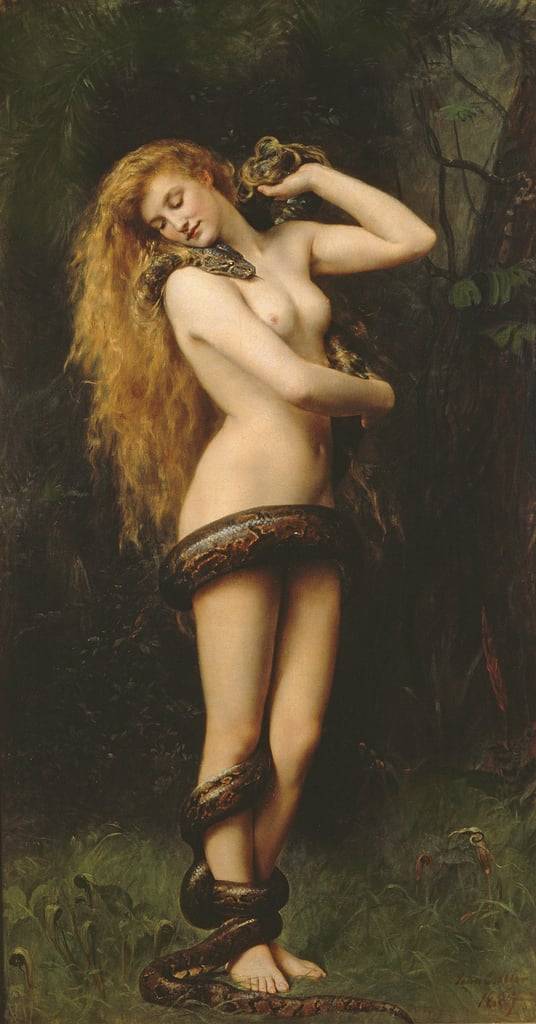
Crowley wishes his mom was this cool with snakes.
A good case can be made that Crowley genuinely likes the color red in addition to considering it demonically appropriate. I say this for three reasons. Firstly, because when he has a (limited) choice of (again, demonically appropriate) colors, he always chooses red. The marble of the desk in his apartment is not green or grey. He can have any color stitching on his gloves or lining of his jacket collar he wants, but it's always red. Secondly, it's not only red he chooses, it's almost always bright red.
We know Crowley's red isn't supposed to represent blood or violence, because we have another demon character whose use of red represents just that, and it's not the same red:
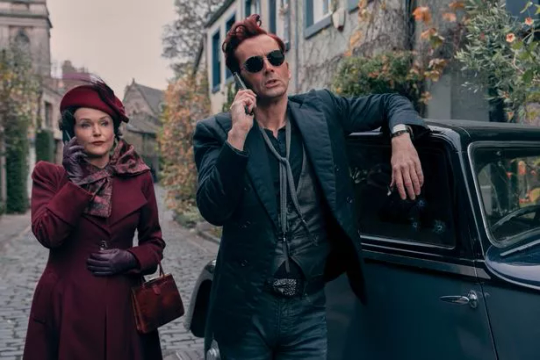
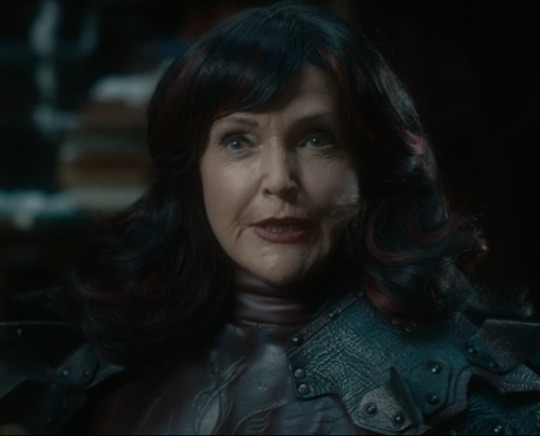
Compare Shax' oxblood and burgundy to
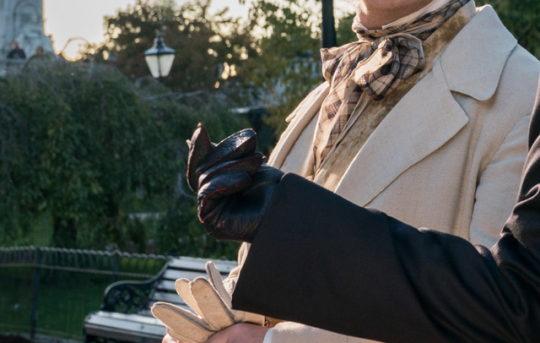
and
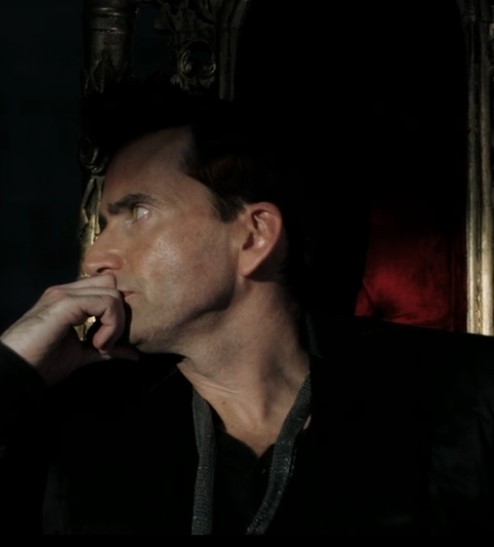
and
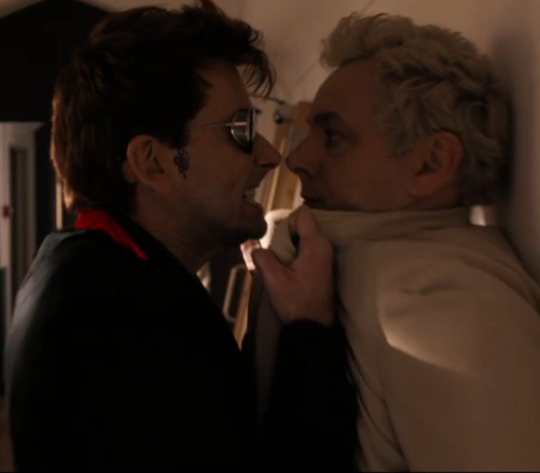
and
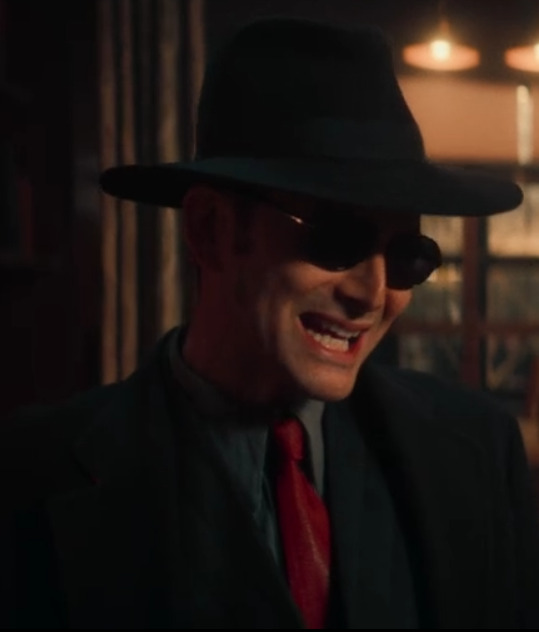
Crowley's red isn't just red, it's lipstick, cherry, crimson red. And in case we weren't sure that we should read this red as symbolizing passionate, romantic love:

Romantic symbolism aside, bright red is also the color of passion (romantic or otherwise), optimism, heat, vitality, life, (hell)fire, and warning.

Red and black says don't fuck with Jack.
The third reason I think we can safely say that Crowley actually likes the color red is that he hides it. It's always tiny little touches, some of which you have to look for to see. (I still don't know where they snuck in the red on his Elizabethan habit, e.g.) And we know this color is a risk for him, and that he is right to hide it, because Ligur, who doesn't approve of any of Crowley's less-than-fully-demonic embellishments and may share Hastur's opinion that Crowley has gone native, comments on one of Crowley's more noticeably colorful items.
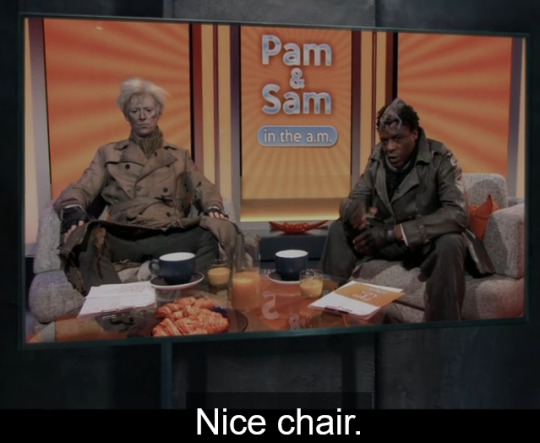
And I think the red tells us one more thing about Crowley, too.
Bright red is the colorest of colors, you know? When we can choose only one color to represent all colors, to represent colorfulness itself, we choose bright red (even in cultures where red symbolizes other meanings than it does in Western art).
Remember how Aziraphale gives Crowley's jacket a tartan collar when he swaps bodies with Crowley and impersonates him in Hell because Aziraphale feels the need to maintain some small secret token of his identity, some tiny unremarked sign of something he loves and thinks is beautiful, when he is down there alone in the gloom among enemies?
Crowley is down there alone among enemies every second of every day and night, whether he's in Hell or on Earth. And he's already had his identity stripped from him once. If you were someone who said
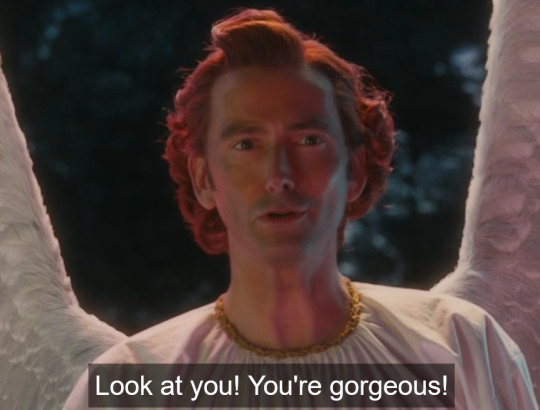
about this
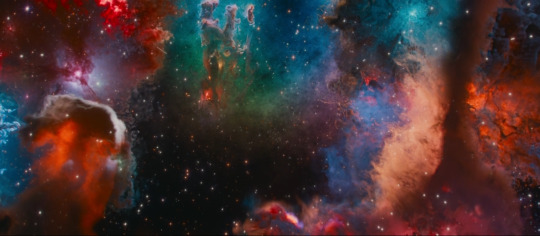
and then you got recruited by the fash downstairs bc the fash upstairs threw you out for not being fashy enough and you had to start wearing nothing but dark colors and more importantly had to hide everything that made you feel warmth or softness or joy, and that was it, that was the deal for eternity, but you could add one (1) little touch to everything you wore to remind yourself that there is some beautiful part of you left, something you loved once, that no one has yet been able to steal or brutalize out of you...what color would the stitching on your gloves be?
Lastly, Yellow represents Crowley to Aziraphale. I'm going to skip the chain of evidence for this bc I think it's obvious, but the way it's used also lends itself to some inferences supported in other areas in the show.
Here's where I think changing Crowley's hair to red from Book Omens' dark is a good decision in another way. Crowley always has red hair, and if he has any color in his clothes it's going to be red. Red is eye-catching; it always stands out, but it doesn't stand out as demonic. And yet the color Aziraphale associates with Crowley and calls "pretty" isn't red.
I suspect that when Aziraphale says he can make Crowley an angel again, Crowley hears "You're not good enough for me to accept you as you are, let me fix you" because these are words Aziraphale has said to him many times, and has meant some of those times. But

tells the audience differently. The color Aziraphale associates with Crowley, the color he calls "pretty," is the color of Crowley's only overtly demonic feature. Aziraphale doesn't love the angel he knew who isn't Crowley, he loves Crowley, the demon, the person he is now, his yellow demon irises.
Yellow appears in three other places in S2, and they're all symbolically significant, and in fact serve to establish another symbolic significance to the color yellow in addition to that of Yellow Is the Color of My True Love's Eyes.
One of them is a feather duster:

Crowley reacts to a feather duster like a cat confronted by an unfamiliar object
The other three are private conversations between Aziraphale and Crowley:

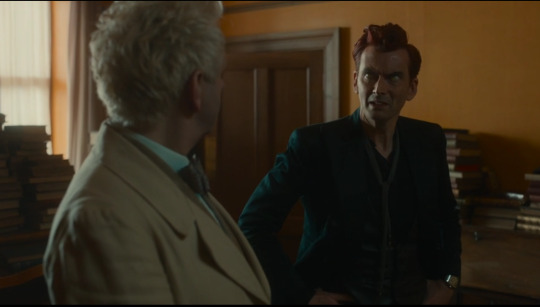

The walls that surround Crowley and Aziraphale when they speak openly about their situation and how they will handle it are drenched in yellow, and that is super interesting, because in Western color symbolism yellow is the color of fear. The archangel of whom Crowley and Aziraphale are both (rightly) terrified wields a tool the color of fear. The color of fear saturates the backdrop of conversations between Aziraphale and Crowley when they have to discuss their situation and their actions openly.
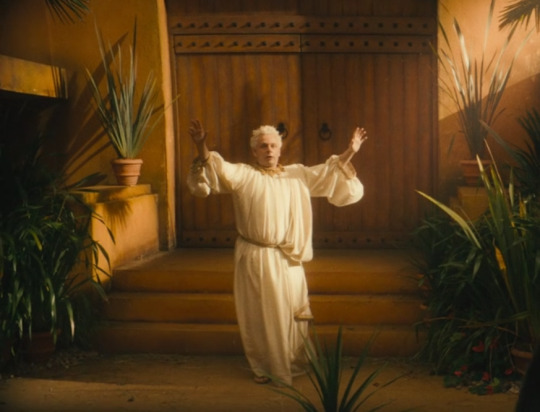
Remember how Aziraphale's voice shakes here?
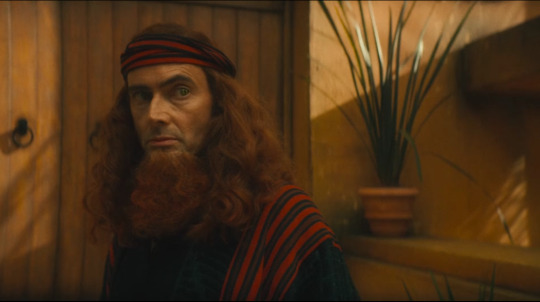
Crowley realizes the crows have just handed an angel evidence the angel can take to Hell and use to have Crowley killed
Even the Bentley, that clear sign of Aziraphale's love for Crowley, is also a yellow coffin enclosing him. For Aziraphale, thoughts of Crowley are always entangled with fear, because Crowley is not just Crowley, he is also Crowley's Fall.

And I think fear is what Crowley's eyes themselves represent. For Crowley, fear is now a fundamental part of his perception, his nature, his identity.
The angel Aziraphale once knew is not Crowley, and yet from what we've seen, the chiefest difference in character between this sweetheart and this mischief-maker--

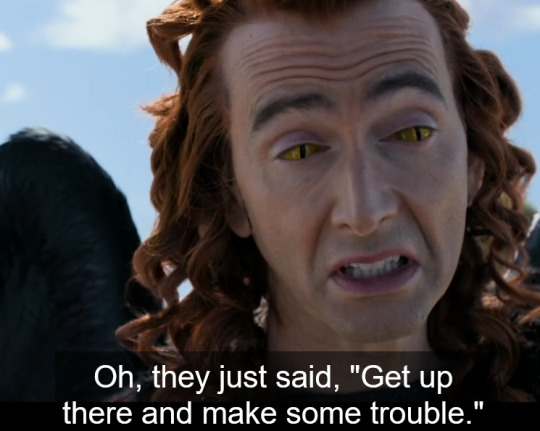
--is that the Starmaker does not know yet that he should be afraid, and the Serpent does. That knowledge and its fear has, shall we say, colored his view of the world.
Aziraphale learns that fear early by observing others rather than Falling himself, and knows enough that by the first time we meet him in the Before, he is already afraid.
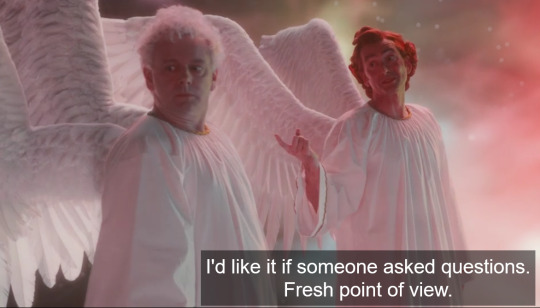
Pink was once symbolically equivalent to red; in modern Western color symbology it is a color of innocence, youth, beauty, and first love. Hashtag just sayin'.
The cruellest thing this suggests to me is that, rather than rebellion or his propensity to ask questions, rather than the knowledge of good and evil, the Starmaker's Fall was caused by his innocence. it wasn't the questions that were the problem: it was that he didn't know any better than to speak them out loud.
Y'all, Crowley and Aziraphale do not suffer from communication problems. Despite both being male-coded and British, they don't even seem to lack emotional intelligence. What they do have is a universe of silence and fear they have to communicate within and around. What they lack is the safety to speak and love freely. The true color of Crowley is crimson, but someone gave him those eyes, and Aziraphale either watched that happen or knew about it, and now Crowley covers himself in black--which btw is also the symbolic color for mystery and secrets--and only lets Aziraphale see him as he really is now, because Aziraphale won't judge him for his yellow eyes (or punish and forsake him for his questions). Because Aziraphale carries that fear with him too.
#good omens#good omens 2#good omens analysis#good omens crowley color analysis#good omens crowley color#crowley#good omens colour analysis good omens crowley colour#good omens colour#good omens meta#angel!crowley#starmaker
1K notes
·
View notes
Text
The danger of "spicy" books
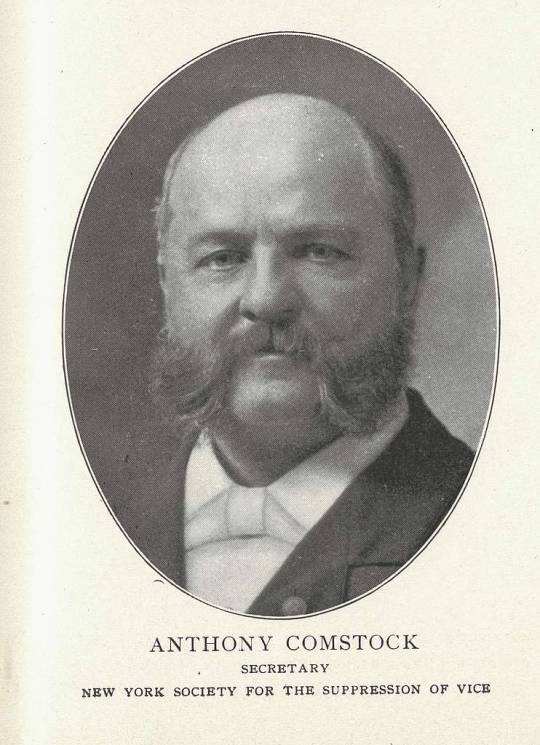
Here's a "concerned" essay from 1891 about the dangers of naughty literature on impressionable young minds. It was written by Anthony Comstock, whom Wikipedia says "was an anti-vice activist, United States Postal Inspector, and secretary of the New York Society for the Suppression of Vice, who was dedicated to upholding Christian morality. He opposed obscene literature, abortion, contraception, masturbation, gambling, prostitution, and patent medicine."
The article is full of anecdotes about the callous, self-serving motivations of authors and the tragic results that ensue when kids get their hands on these publications.
The essay's closing paragraph reads:
Save our youth from this fetid blast of corruption which is being sent out by the fiery greed of thoughtless, reckless, or criminal authors and publishers. Authors and publishers need to call a halt upon themselves, ere they further curse the youth of this free land and undermine our free institutions.
Thank goodness that more than a century later we no longer have to worry about authorities spouting beliefs like these... Right?
1K notes
·
View notes
Text
Writing Notes: Allegory

Allegory - a story that alludes to other literary works or comments on common conditions of life.
When a work or its passages are allegorical, they are similar to an event, character or setting in a story that is universally known: a fable, a parable in the Bible, or a Greek myth.
Allegories have 2 levels of narration occurring at the same time: the actual events, characters and setting presented in the story, and the ideas they are intended to convey or the significance they bear.
3 Literary Forms that you might use when discussing allegory:
Fable. A fable is a short story, often featuring animals with human traits, to which writers attach morals or explanations.
Parable. Parables are most often associated with Jesus Christ, who used them in His teachings. They are short narratives that exemplify religious truths or insights.
Myth. Myths are stories, either short or long, that are often associated with religion and philosophy and with various races and cultures. They embody the social and cultural values of the civilization during which they were written.
When writing about allegory, determine whether all or part of the story is allegorical.
Sustained allegory. This occurs when a story’s allegory continues throughout the work, from beginning to end. The sole purpose is to convey the dominant idea. The idea is emphasized rather than the story’s actual (literal) details. For example, The Pilgrim’s Progress is a story about Christian’s difficult journey from his home in the City of Destruction to his new home in the Heavenly City. But the main idea is about the rigors and trials of Christian life.
Episodic allegory. This occurs when a story contains an allegorical episode or passage. The passage is based on both the actual (literal) events in the story and the allegorical elements. For example, during one scene in the film Star Wars, Darth Vader imprisons Luke Skywalker, and Skywalker must exert all his skill and strength to get free and to overcome Vader. This temporary imprisonment signifies those moments of doubt and discouragement that people experience while trying to overcome obstacles. Similar heroic deeds have been represented allegorically in the stories of Jason and the Argonauts and Beowulf and Grendel.
When analyzing allegory, ask yourself the following questions:
The application of allegory. Does the allegory (fable, parable, myth) refer to anything or anyone specific? Does it refer to an action or particular period of history? Or does the allegory refer to human tendencies or ideas? Does it illustrate, point by point, particular philosophies or religions? If the allegory seems outdated, how much can be applied for people living today?
The consistency of allegory. Is the allegory maintained consistently throughout the work, or is it intermittently used? Explain and detail this use.
Do extra reading and research:
To understand allegorical implications in a story, you have to become familiar with the source of the similarities.
Allegorical sources include world history, classic works of literature, and archetypal ideas, such as the “quest” or “coming of age.”
You might need to use a dictionary, encyclopedia, or other reference book. For example, you would not recognize that the musical West Side Story is allegorical unless you were aware of its similarities to a classic work of literature: Romeo and Juliet. Thus, to see certain implications in West Side Story, you have to have a general grasp of Shakespeare’s play.
Remember: As long as the similarities are close and consistent, your allegorical interpretations of the story will be valid.
If these writing notes help with your poem/story, do tag me. Or send me a link. I'd love to read them!
#writing notes#allegory#writeblr#writers on tumblr#dark academia#spilled ink#poets on tumblr#poetry#writing prompt#literature#creative writing#light academia#studyblr#lit#writing reference#writing resources
160 notes
·
View notes